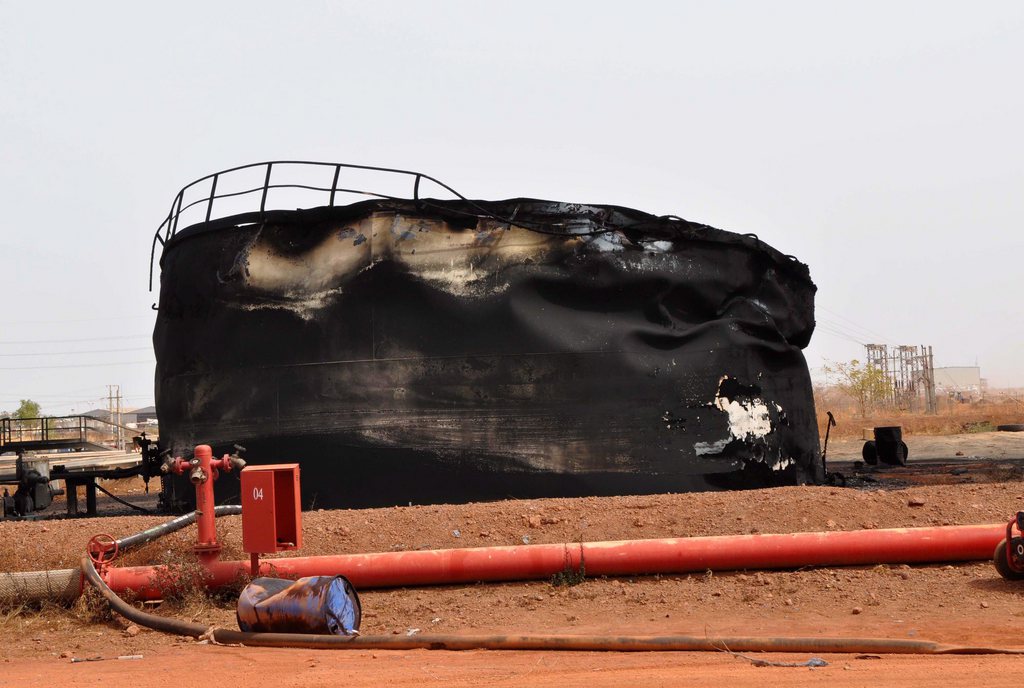Greasing the wheels of energy and food supply

You may not think buying a chocolate bar from a supermarket or filling up a car with fuel would have anything to do with the huge fine given to French bank PNB Paribas earlier this week. But they do.
The bank has been key in providing the financial muscle backing the global shipment of raw materials – and Switzerland is the leading location for commodity trade finance.
The Swiss Bankers AssociationExternal link has calculated that in 2011 Switzerland bankrolled the industry to the tune of $1.5 trillion (CHF1.35 trillion), around a quarter of the total volume of credit issued around the world to finance commodity deals. That places Switzerland in pole position in the lucrative business.
The burgeoning Swiss commodity trading sector is therefore abuzz with speculation that one of its leading lenders, BNP ParibasExternal link, might be forced to withdraw its credit services after a stinging United States punishment for sanctions busting. On Monday, it was fined nearly $9 billion.
Commodity trade finance
Banks, specialist funds and commodities traders themselves fund the extraction, warehousing, shipment, processing, packaging, inspection and final distribution of raw materials.
The volume of commodity trade finance reached more than $6 trillion in 2011, according to the World Trade Organisation.
The complex financial deals cover a range of aspects, from letters of credit which allow traders to buy raw materials in one place and sell them in another country weeks later to bankrolling fleets of ships and aircraft and providing derivative instruments to insure against price fluctuations.
The transactions are carried out against a backdrop of volatility in commodity prices. While the value of raw materials has steadily risen in the past two decades, some years (such as 2009) have seen prices suddenly plummet.
Commodities also attract a growing number of new investors all seeking higher returns in a low interest rate environment.
US investment fund Blackrock estimates the value of commodities funds had reached $203 billion by the start of 2013, while the Swiss Bankers Association says Swiss investments rose from CHF4.3 billion in 2007 to CHF37 billion by the end of 2012.
The bank’s oil and gas, energy and commodity finance business is acknowledged as a pioneer in financing the storage and shipment of oil, metals, gas and foodstuffs around the world. Swiss traders rely on the Geneva-based unit to grease the wheels of deals and cover the often weeks-long gap between buying raw materials and receiving payments on delivery.
The Geneva branch was also fingered by the US Department of Justice on Monday for conducting some $6 billion in illegal trades in and out of Sudan for a number of years. As a result, it will be banned from conducting US dollar-denominated transactions for the whole of 2015.
As the vast majority of commodity trades are carried out in dollars, questions have been raised about the ability of the bank to continue this business line. BNP Paribas insists it will sidestep this impediment by finding another bank to clear its dollar transactions on its behalf next year.
Fighting talk
The bank said it “expects no impact on its operational or business capabilities to serve the vast majority of its clients”.
But BNP Paribas’s chief financial officer Lars Machenil warned in a press conference that it would be “a heavy process” to arrange such a deal.
“We have, of course, been attentive to our clients and have in general not observed any massive uncertainty,” he said, in an effort to alleviate concerns surrounding the business.
The media have raised doubts about whether another financial institute would want to assume the risk of taking on BNP Paribas’s dollar transactions given the nature of the punishment handed out on July 1.
The Fitch ratings agency has more faith in BNP Paribas. “We expect the bank to enter into a commercial agreement with a third-party US bank … and [we] believe that this should not result in a material curtailment or disruption of its operations or in a franchise loss in its trade finance business,” it stated in a press release.
But the bars and coffee shops, which water Geneva commodity traders, are buzzing with more sceptical tones.
“There is a lot of discussion about whether they will maintain this business line,” Nicolas Sanchez, director of commodity finance company eurofinasia’s Geneva branch, told swissinfo.ch.
“The impact of their withdrawal would depend on how quickly they did it. If they fade away progressively, it would still be a shock but not so much a problem as if they ceased providing credit suddenly, which is not expected.”
Cash diversification
The Geneva Trading and Shipping AssociationExternal link (GTSA), the main representative body of the commodities industry in the region, said it was too early to assess the possible impact of the BNP Paribas punishment.
However, the organisation pointed out that the trade finance scene had already undergone a number of changes since the post-financial crash credit crunch when some traditional bank lenders were forced to scale back their commodities lending operations.
“The gap has been filled by the existing players and also new ones, such as banks from other geographical regions or dedicated funds,” GTSA wrote in a statement to swissinfo.ch. “The commodity trading houses have already diversified their sources of liquidity and have turned to new players as providers.”
One of those new providers, eurofinasia, set up in Singapore in 2003 before branching out into Geneva. The specialised cash pot for traders is attracting new sources of investments, from pension funds or family offices, for example.
Big trading houses, such as Glencore and Mercuria, have set up their own trade finance operations, effectively extending lines of credit to their own customers.
More demand than ever
This solution might not be to the liking of all traders though, according to Samir Zreikat, founder of Geneva-based commodity sector services firm Dealigents. “It could be a case of playing with the devil for smaller traders who open their books to their larger competitors in order to secure credit,” he told swissinfo.ch.
“They would be unwittingly giving up key competitive information on the niche markets they have developed.”
Given the rise in commodity prices over the past two decades, the sector will have to continue to adapt to meet the growing appetite for finance. The cargo value of oil has quadrupled since 1993, according to the International Monetary Fund’s commodity prices index, while copper has trebled and wheat doubled in value.
The role of finance in ensuring that chocolate bars reach supermarket shelves and fuel arrives at filling stations has never been more acute. With or without BNP Paribas, Switzerland wants to continue meeting the lion’s share of that finance for some time to come.
Swiss commodities industry
The number of Swiss commodities traders has swelled dramatically since the turn of the millennium.
There are now an estimated 570 trading houses in Switzerland, most of them located in the Geneva region but also in Zug, Zurich and Lugano, employing some 7,500 staff in 2010.
Another 2,000 people were employed in related services areas, such as inspection, legal and finance, according to the Swiss Bankers Association.
Net income from commodities trading in Switzerland rose from CHF2 billion in 2002 to CHF20 billion in 2011, according to the Swiss National Bank.
Federal Technology Institute ETH Zurich’s economic institute estimates that the industry accounted for 3.6% of gross domestic product by 2010.
The Geneva Trading and Shipping Association calculates that one third of all the world’s crude oil is traded through Geneva. The region is also global number one for coal and cotton trading and the European leader for sugar.

In compliance with the JTI standards
More: SWI swissinfo.ch certified by the Journalism Trust Initiative



You can find an overview of ongoing debates with our journalists here. Please join us!
If you want to start a conversation about a topic raised in this article or want to report factual errors, email us at english@swissinfo.ch.